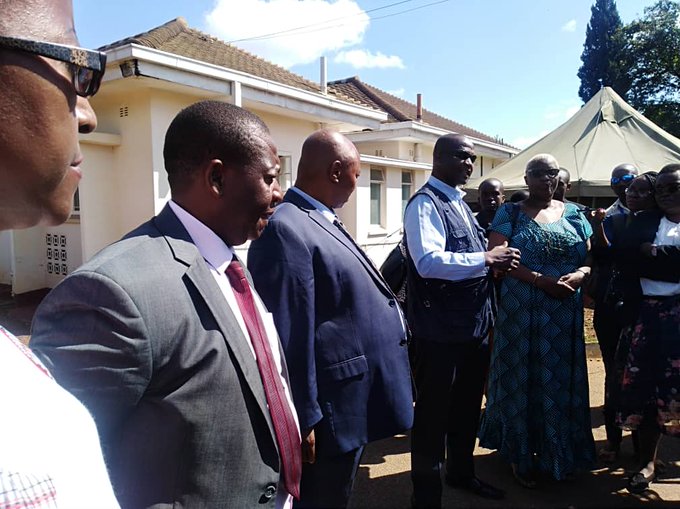By Joyce Mukucha and Anyway Yotamu
Despite the Zimbabwean government’s claims that the country is ready to deal with the coronavirus (Covid-19), a Government official said operations of staff at Robert Gabriel Mugabe International Airport lacked the capacity to effectively deal with the disease.
The Chairperson of the Parliamentary Portfolio Committee on Health, Dr Ruth Labode said airports and boarder posts were more crucial for assessment in as much as preparedness to prevent coronavirus outbreak is concerned.
She was speaking during the Parlimentary Portfolio Committee on Health and Child Care tour of Wilkins Hospital and the RGM International airport on the 11th of March 2020.
“We should be able to be prepared for Covid-19 when it comes to Zimbabwe for it is very frightening. This is the reason why the Parliament of Zimbabwe has taken this decision to visit Wilkins Hospital and the International airport as a way of trying to assess the level of preparedness in fighting the deadly disease. As Zimbabwe, Wilkins is quietly prepared to prevent the virus. Following that we observed that the staff is well equipped and is conscious and have protective regalia. However, at the RGM International airport a lot of work still needs to be done to ensure that the staff invests in protecting the nation.
“Though the staff is conscious at the airport, they do not have adequate resources as witnessed at Wilkins where the staff have proper regalia pertaining preventing COVID. Here, the workers do not have masks, and the immigration officers do not seem to be interrogating much the travellers in order to have more information about them before stamping their passports. Let me say that the Civil Aviation Authority of Zimbabwe (CAAZ), Zimbabwe Revenue Authority (ZIMRA) and other departments are making efforts but more gaps need to be dealt with such as extending more training to the staff and ensuring that they are well equipped. There is need to extend more education to the staff, sensitise them and ensure that they are capable of handling the situation and protect the public,” she said.
Concerning what has been done so far in responding to COVID-19, the Port Health Authority and CAAZ are taking the lead with the emergency committees on the ground.
The Ministry of Health Representative Margret Tawodzera said they were committed to remain vivid in attending to the virus. Currently, she said, 150 facilities for screening have been established and the activities are being guided by the World Health Organisation. The Department for International Development (DfID) and other partners are also assisting. In provinces, both urban and rural areas, the staff has been deployed to continuously do follow-ups for coronavirus suspects and quarantine them especially those who are coming into the country.
In Harare, the facilities which have been selected as quarantine centres for coronavirus are at Wilkins Hospital where protective clothing and equipment is available.
DfID donated supplies of personal protective equipment, computers, data services and television monitoring equipment to the World Health Organisation’s (WHO) Public Health Emergency Operations.
The Port Health Officer, Phumuzile Dutiro said surveillance was being done for people coming from infected nations and sensitisation is also being conducted among the staff so as to ensure that they are well informed on handling the situation. Other trainings, she said, were ongoing in Kadoma to keep abreast in terms of WHO guidelines and recommendations.
More focus was being given at the point of entry, and if there are any suspected cases. The Harare City should be notified as well to ensure availability of ambulance services to attend to the cases. The ambulance is manned by trained personnel who on their way to the patient informs the team at Wilkins about the case.
Margaret Mantiziba, the CAAZ Acting Director General said it was an honour for them to be joined by Members of parliament as law makers in paving the best way which guarantees the nation’s safety.
In terms of treatment, Harare City Council Health Services Director Dr Prosper Chonzi told journalists that experimental anti-retroviral treatment has not yet been clearly prescribed and is still being researched on. He said WHO had delivered some supplies and the material from the WHO was being distributed countrywide.
“The kind of treatment we are administering is mostly supportive treatment where we give antibiotics and where a person is struggling to breathe, we provide oxygen and for dehydration. We administer IV (intravenous) fluid and we have that in stock. If we get a case, we are able to isolate and treat although there was a delay in getting the stocks. As for now, we are not yet treating with antiretroviral drugs,” he said.
It has been also revealed that when a suspect and infected person arrives at Wilkins Hospital,the health team starts preparing to receive the patient and putting on the protective clothing which includes latex gloves, spacesuist, goggles, N95 respirators and gumboots.
After attending to the patient, the clothing should be burnt and cannot be worn again in case it gets infected. Ideally, the clothing should be burnt close to the point of infection because transporting them might result in further infection.
Wilkins Hospital has so far admitted three suspected cases that the authorities say have tested negative to coronavirus. This comes as neighbouring South Africa recently recorded 7 confirmed case of Covid-19, with Health Minister Moyo describing it as a warning sign.






